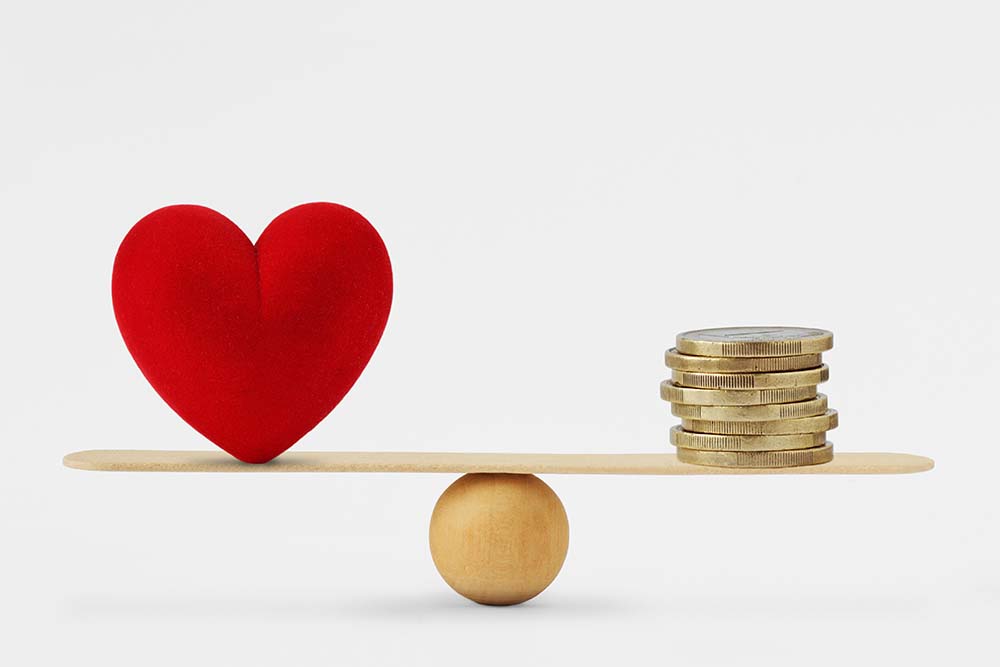Health is wealth. Yes, we know. The idea that your well-being is far more important than anything else cannot be disputed. However, what all of us fail to understand is that conversely, wealth can also translate into better health. Money and wellness have long been looked at as separate entities; however, this is not necessarily true. Your financial stability can impact all other aspects of your health. Digital wealth management firm Scripbox conducted a survey a couple of years ago, which revealed that 90 per cent of Indians believe that financial wellness has an impact on their well-being. Several factors make up the link between money and good health.
Higher Nutrition Levels
Money may not buy happiness, but it is definitely handy to buy good health. Dietician and nutritionist Kesari Lakshminarayan says, “Eating healthy need not necessarily be expensive for a certain socio-economic stratum of women if they buy local, fresh produce. However, for demographics that just about earn a comfortable wage, a healthy diet is much more expensive and challenging. So they opt for one that is just filling or calorie-sufficient. If a woman who is a daily wage labourer can afford only rice and lentils for herself and her family, it is not necessarily unhealthy, but then it lacks other essential nutrients. Fruits, nuts and even certain vegetables might be prohibitively expensive for them. Overall, the dietary intake is much poorer. Organic food is another challenge to procure since it is priced at a premium when compared to conventional produce. Even while eating out, restaurants which use quality ingredients and focus on nutrition, tend to charge more than fast food places or those that offer sugary drinks and carb-heavy, cost-effective meals.”
Healthcare Bills
Thicker wallets allow you to pay the bills for medical help and assistance, without spiralling into neglect, debt or worry. According to the National Family Health Survey (NFHS), around 60 per cent of India’s women – more than half of the female population – faces trouble accessing healthcare. In government hospitals, the average cost of out-of-pocket hospitalisation for rural women is ₹3,350 and for urban women is ₹4,100. In a private facility, these costs are accelerated to ₹21898 and ₹28,988 respectively. Healthcare and medical bills for women do not only include ailments related to menstruation, fertility, childbirth and menopause. They also include preventive healthcare such as master health checkups, vitamins and supplements. Other diseases such as heart health, diabetes and cancers can also be detected early with timely intervention. The disparities in healthcare access for women are directly linked to their financial well-being and economic status.
Access To Fitness
A large part of staying active includes an exercise programme. Now this does not necessarily require an expensive gym membership. A lot of women can stay fit with regular walks or jogs, doing their own household chores, playing a sport or finding joy in dancing. However, for those of us who need that extra bit of motivation, fitness memberships can go a long way in providing effective programmes that are tailor-made to suit your body’s unique needs and challenges. Whether it is pilates, yoga or strength training, they can give you the extra edge and help alleviate problems such as bone degeneration, muscle strength, digestive issues, etc.

Mental Health & Happiness
A PricewaterhouseCoopers (PwC) study stated that 76 per cent of stressed employees say that financial worries have a negative impact on their productivity. This applies to all walks of life. Financial well-being is directly linked to mental health. Yes, issues such as anxiety or depression can happen to anyone. But in part, financial difficulties can cause undue stress and worry, two factors that trigger various mental health problems. It eventually becomes a vicious circle, where poor mental health often results in bad money management. This in turn fuels lower self-esteem and sends the mental health spiral downwards. For people with debt, this can be especially trying, especially since they see no way out. Motivation – both externally and internally – is hard to come by and this results in prolonged financial instability.
Even with finance being a barrier to achieving these basic wellness goals, steps can be taken to ensure that the challenges aren’t insurmountable. Mutual fund and insurance agent Leon Pandian has some pointers to close the gap between money and health for those who find they are struggling with it.
1. Find logical, small, step-by-step solutions to your financial problems. This includes being debt free, and then setting aside a budget to prioritise fitness and nutrition on a regular basis. Cut out the extras that you can do without until you reach this point. Eat out lesser as much as you can help it, and invest that money into quality ingredients for your kitchen.
2. Get a good health insurance plan that covers not just the basics, but also a wider range of ailments and inclusions. You don’t want to be caught out on a few loopholes or technicalities. Consult someone you trust and read the fine print thoroughly. An insurance plan is key to preventing your money from being eroded by hospital bills and treatments. Worse, you don’t want to go into credit card debt or take a loan to pay healthcare expenses.
3. Keep mental stress away by practising mindfulness and breathing exercises. Anxiety isn’t going to resolve any issues; it is only going to compound them. Instead of panicking, it might be a good idea to channel your energy into bolstering your financial wellness. Consider seeking help such as free or cost-effective counselling sessions if you are unable to cope.
4. Stay active and happy. Prepare for the future and put money into long-term savings plans that are risk-free. Your retirement will be that much easier.
5. If all else fails, seek financial therapy. Trained and credible finance professionals will be able to help you set your goals in order, recognise your problem areas and help improve your negative feelings as well as your bank balance!